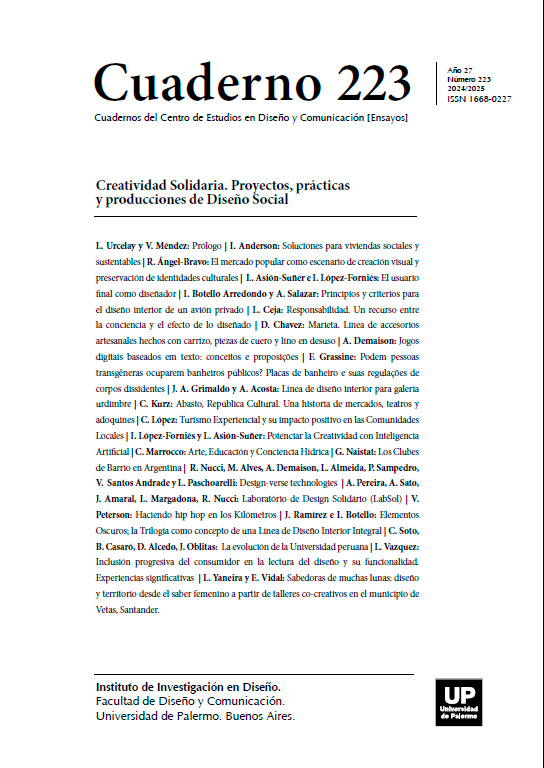Jogos digitais baseados em texto: conceitos e proposições
Résumé
Este artigo busca trazer uma análise preliminar sobre a viabilidade do uso de jogos digitais baseados em texto (Text-based games - TBG), bastante populares para computadores pessoais nas décadas de 1980 e 1990, em sistemas gamificados e intervenções baseadas em jogos.
Références
Atkinson, T., Baier, H., Copplestone, T., Devlin, S., & Swan, J. (2018). The Text-Based Adventure AI Competition. In IEEE Transactions on Games, 11 (pp. 260-266). Cobbett,R. (2017, 19 de maio). The history of RPGs. PC Gamer. https://www.pcgamer.com/the-complete-history-of-rpgs/
Cobbett, R. (2021, 16 de outubro). Crapshoot: Rockstar, the game that turned sex, drugs, and rock & roll into a management sim. PC Gamer. https://www.pcgamer.com/saturdaycrapshoot-rockstar/
Dambekodi, S., Frazier, S., Ammanabrolu, P., & Riedl, M. O. (2020). Playing text-based games with common sense. In Proceedings of the NeurIPS Workshop on Wordplay: When Language Meets Games (pp. 1-7). Neural Information Processing Systems.
Edwards, B. (2009, 19 de julho). Forty Years of Lunar Lander. Technologizer. https://technologizer.com/2009/07/19/lunar-lander/
Edwards, B. (2017, 4 de abril). The Forgotten World of Teletype Computer Games. PCMag. https://www.pcmag.com/news/the-forgotten-world-of-teletype-computer-games
Hupsel, Y. (2023, 20 de setembro). Text Adventures: o gênero que resistiu ao tempo e continua vivo. Game Blast. https://www.gameblast.com.br/2023/09/text-adventures- generoresistiu-tempo-continua-vivo.html
Kelley, D. (2014). The Art of Reasoning: An Introduction to Logic and Critical Thinking (Fourth Edition). W. W. Norton & Company. New York.
Koster, R. (2005). A Theory of Fun for Game Design. O’Reilly Media, Inc.
Järvinen, A. (2008). Games without frontiers: Theories and methods for game studies and design. Tampere University Press.
Lucchese, F. & Ribeiro, B. (2009). Conceituação de jogos digitais. Universidade Estadual de Campinas (UNICAMP). http://www.dca.fee.unicamp.br/~martino/disciplinas/ia369/trabalhos/t1g3.pdf.
Madotto, A., Namazifar, M., Huizinga, J., Molino, P., Ecoffet, A., Zheng, H., Papangelis, A., Yu, D., Khatri, C., & Tür, G. (2020). Exploration Based Language Learning for Text-Based Games. In Proceedings of the 27th International Joint Conference on Artificial Intelligence (IJCAI-20) (pp. 1488-1494). International Joint Conferences on Artificial Intelligence.
Manuaba, I. B. K. (2017). Text-Based Games as Potential Media for Improving Reading Behaviour in Indonesia. Procedia Computer Science, 116, 214-221. https://doi.org/10.1016/j. procs.2017.10.041
Narasimhan, K., Kulkarni, T. & Barzilay, R. (2015). Language Understanding for Text-based Games using Deep Reinforcement Learning. In Proceedings of the 2015 Conference on Empirical Methods in Natural Language Processing (pp. 1–11). Lisboa, Portugal. Association for Computational Linguistics.
Norman, J. (s.d.). “Adventure”, or “Colossal Cave Adventure”, is the First Computer Text Adventure Game. History of Information. https://www.historyofinformation.com/ detail.php?id=2020
Ribeiro, I. C. M. (2021). Gamificação para o aprendizado: projeto e desenvolvimento de um text-based game voltado para o ensino de História sobre o Brasil colonial. Trabalho de Conclusão de Curso, Universidade Federal do Rio Grande do Norte (UFRN).
Xu, Y., Fang, M., Chen, L., Du, Y., Zhou, J. & Zhang, C. (2022). Perceiving the World: Question-guided Reinforcement Learning for Text-based Games. In Proceedings of the 60th Annual Meeting of the Association for Computational Linguistics (Volume 1:Long Papers) (pp. 538–560). Dublin, Irlanda. Association for Computational Linguistics.
Yuan, X., Côté, M., Sordoni, A., Laroche, R., Combes, R. T., Hausknecht, M. J., & Trischler, A. (2019). Counting to explore and generalize in text-based games. In Proceedings of the Exploration in Reinforcement Learning Workshop at the 35th International Conference on Machine Learning (pp. 1-6). Estocolmo, Suécia.
Los autores/as que publiquen en esta revista ceden los derechos de autor y de publicación a "Cuadernos del Centro de Estudios de Diseño y Comunicación", Aceptando el registro de su trabajo bajo una licencia de atribución de Creative Commons, que permite a terceros utilizar lo publicado siempre que de el crédito pertinente a los autores y a esta revista.


